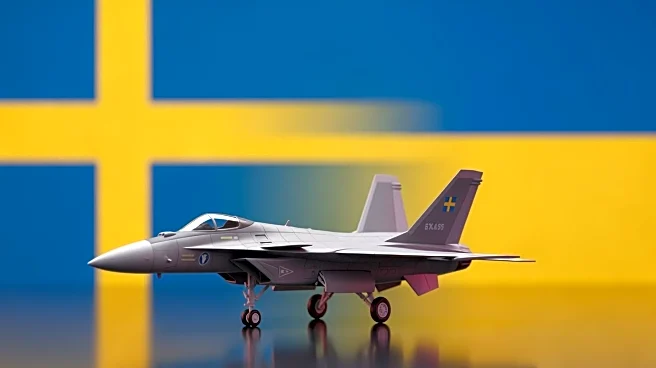What's Happening?
Ukrainian President Volodymyr Zelenskyy visited Sweden to discuss a potential defense export deal involving Gripen fighter jets. The meeting with Swedish Prime Minister Ulf Kristersson took place in Linköping,
home to Saab, the manufacturer of the Gripen aircraft. Sweden has been considering sending Gripen jets to Ukraine for over a year, with Ukrainian pilots having successfully tested the jets in 2023. However, the transfer of these jets is contingent on Ukraine's accession to NATO, a process currently delayed by Hungary's refusal to ratify the protocol. Despite the delays, Sweden remains committed to supporting Ukraine against Russian aggression.
Why It's Important?
The potential deal for Gripen fighter jets is significant as it underscores Sweden's support for Ukraine amidst ongoing Russian aggression. The transfer of advanced military equipment like the Gripen jets could enhance Ukraine's defense capabilities, providing a strategic advantage in the conflict. However, the delay in Ukraine's NATO accession poses challenges, as the transfer is contingent on this membership. The situation highlights the geopolitical complexities in Europe, with Hungary's stance affecting broader defense strategies. The deal also reflects Sweden's role in European defense and its commitment to supporting allies in times of conflict.
What's Next?
If the Swedish government approves the transfer of Gripen jets, the process could be expedited, according to Saab officials. However, Ukraine's NATO accession remains a critical factor, with ongoing diplomatic efforts to resolve the impasse with Hungary. The situation may prompt further discussions among European nations regarding defense support for Ukraine. Additionally, Ukraine's current reliance on U.S.-made F-16s and French Mirage 2000 aircraft suggests a strategic diversification in its military assets, which could influence future defense procurement decisions.
Beyond the Headlines
The potential Gripen deal raises broader questions about the balance of power in Europe and the role of smaller nations like Sweden in shaping defense policies. It also highlights the importance of international alliances and the impact of individual member states on collective security decisions. The situation may lead to increased pressure on Hungary to reconsider its position, as other European nations seek to bolster Ukraine's defense capabilities. Furthermore, the deal could influence future military procurement strategies, emphasizing the need for adaptable and versatile defense solutions in response to evolving geopolitical threats.









